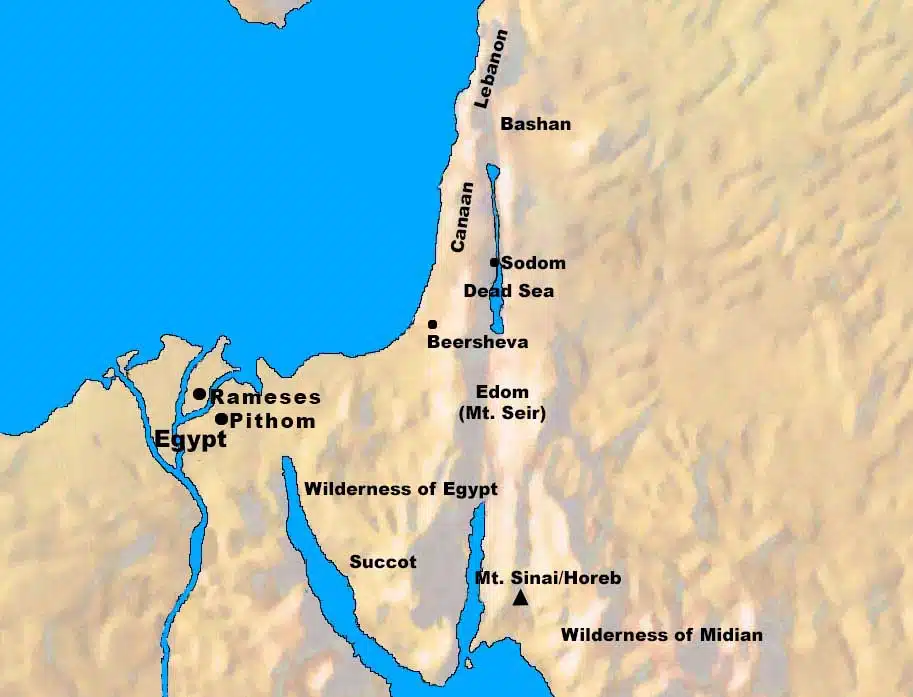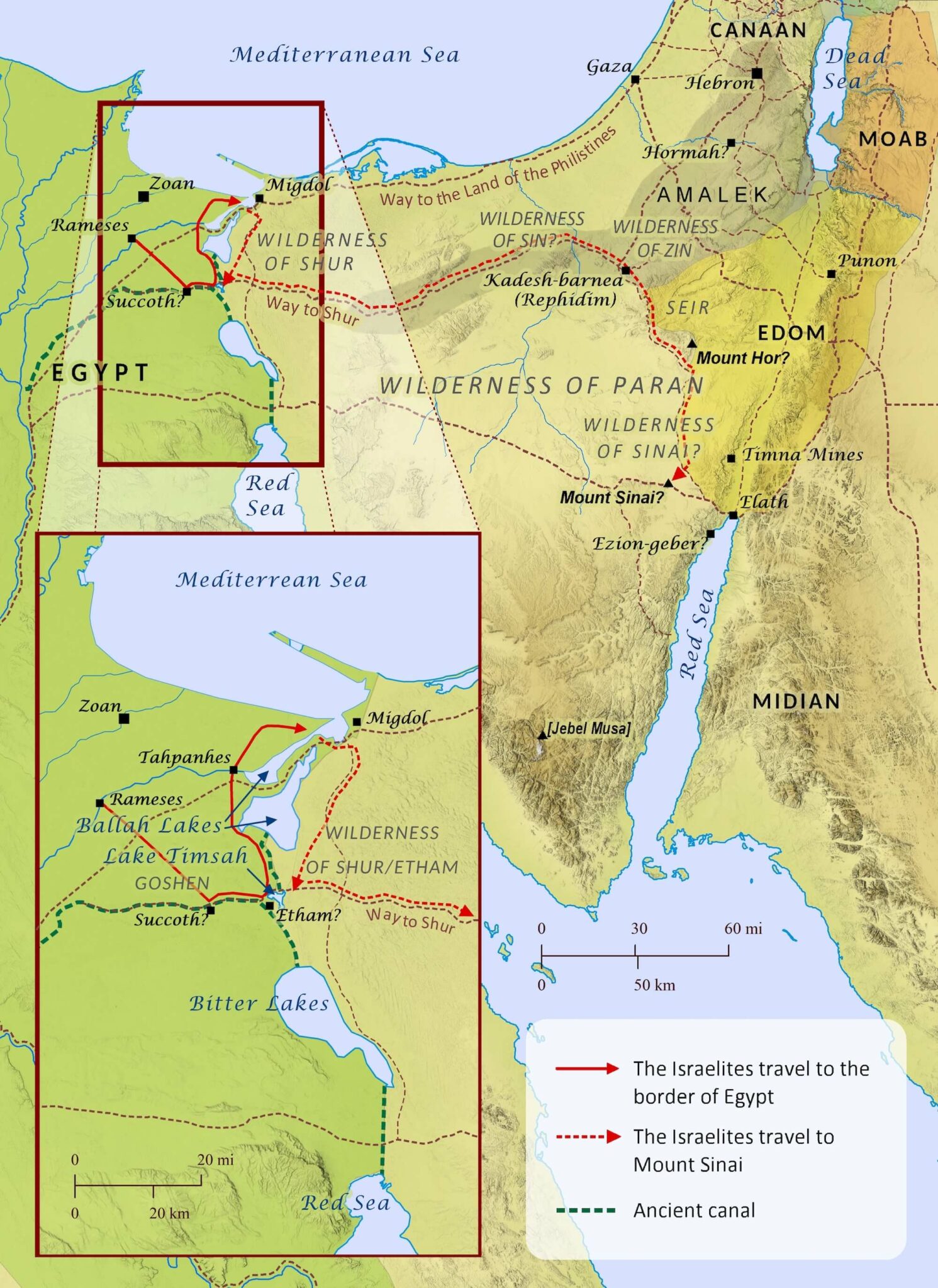Moses and the Israelites sang a song of praise to God.
Though there are several ways to analyze its structure, the outline of the Song of the Sea is covered here as follows:
- The Resolve to Praise the LORD because of who He is (15:1 – 3)
- The Reason and need for Praise to the LORD (15:4 – 13)
- The Result of Praise (15:14 – 18)
In the first part of the song (verses 1 – 3), the sons of Israel proclaim their intention to praise and thank the LORD for what He has done at the Red Sea. The song is introduced in the first part of verse 1 – Moses and the sons of Israel sang this song to the Lord, and said. The men sang what is in the first eighteen verses and women sang what is in verse 21.
The first line in the song (verse 1b) contains the nature of the praise as being a song (I will sing to the Lord) and the reason for the praise – He is highly exalted. The Hebrew word for “sing” (shir) is used often in the book of Psalms along with other words for expressions of praise, in this case with song (Psalms 21:13, 30:4, 33:2, 146:2). The phrase “highly exalted” is quite intense in the Hebrew, giving the sense of the LORD being “greatly majestic” or “extremely glorious.” The idea conveyed is that He is incomparable in light of His marvelous deliverance of His people.
The reason for this praise song was that the horse and its rider He has hurled into the sea. Since we are told that the Egyptians pursued the Israelites with chariots, the word “rider” probably refers to the persons in the chariots. It could also be seen as a figure of speech painting a picture that both horses and men were drowned.
The imagery used here that the LORD has “hurled” (literally “thrown”) the Egyptians into the sea. We know the waters actually fell upon them as they pursued the Israelites (14:28). The song takes poetic license to emphasize that they were drowned in the sea by the hand of the Lord.
Verses 2 – 3 contain what is called “descriptive praise,” which essentially praises the LORD for who He is (that is, His attributes). It begins with The Lord is my strength and song. This literally reads “my strength and song is Yah.” Many scholars think that the word Hebrew word translated “song” (zimrat) should be understood as meaning “power.” If this is the case, it would be properly translated as “strong power.” This makes sense, as the next phrase declares that He has become my salvation. This salvation undoubtedly refers to Israel’s deliverance from the Egyptians at the Red Sea, by the LORD’s “strong power.”
In the next two lines, the singers proclaim that this is my God, and I will praise Him. He is called “my God” (Heb. eli) here instead of the LORD. This term, as well related names such as El, Elohim, and El-Elyon tend to stress God’s power, including His power as the Creator of the universe. The LORD tends to stress God’s relationship with Israel.
The word for “praise” (Heb. navah) in this verse is unusual. It is used only here in the Old Testament. It may mean “to adorn” or “to make beautiful.” If so, it would convey the idea of “adorn with praise,” recognizing the worthiness of God the Creator to receive honor for His great deed.
Using synonymous parallelism, the singers reiterated what was said in the previous line. Here, he stated that He is not only my God that will be praised but also my father’s God. The emphasis is on the continuity of God as the God of Israel. Because the LORD is the source of life, a constant support, and the salvation for His people, the singers will extol (or “exalt”) Him.
Notice the personal nature of this praise with the repeated use of “my.” To the singer, this was not abstract theology – his deliverance by the LORD was a vivid experience that was personal.
The last stanza in this section states that the Lord is a warrior. Literally, it reads “Yahweh is a man of war.” It describes the LORD as One who has the power to fight and be victorious over His enemies. The name LORD stresses God’s covenant relationship with Israel. He is confirming to his people that he will fight for them. In chapter 13, God said He did not lead Israel by the shorter route lest they see war and return to Egypt. They weren’t yet prepared to fight. God is showing Israel that He would fight on their behalf.
Lastly, the singer proclaimed that the Lord is His name. Combined with the previous two lines, the singers were declaring that there is no God but the LORD and He is worthy of praise. The name LORD (Heb. Yahweh) emphasizes his relationship with Israel. The LORD who chose to make a covenant with Israel is worthy of all of Israel’s praise.
To recap, in verses 1 – 3, the singers resolved to sing praises to the LORD because of who He is. He was the triumphant God who overthrew Pharaoh and his army. He was the source of their strength and the One who saved them. He was their powerful Creator and mighty warrior who deserved their constant praise.
Biblical Text:
1Then Moses and the sons of Israel sang this song to the Lord, and said,
“I will sing to
the Lord, for He is
highly exalted;
The horse and its rider He has hurled into the sea.
2 “The Lord is my strength and song,
And He has become my salvation;
This is my God, and I will praise Him;
My father’s God, and I will extol Him.
3 “The Lord is a warrior;
The Lord is His name.
Check out our other commentaries:
-
Ecclesiastes 7:7-10 meaning
Life has distractions and temptations, but patience and appreciating the present are the wisest options....... -
Matthew 25:31-46 meaning
The Parable of the Sheep and the Goats: “The Context of the Parable” Jesus ends His Olivet Discourse with a teaching about a series of Divine...... -
Hebrews 9:13-15 meaning
If the blood of animals was able to cleanse sins, then through the blood of Christ we will gain much more, leading to a life...... -
Matthew 4:1 meaning
Following His baptism by John, the Holy Spirit leads Jesus into the wilderness to be tempted by the devil....... -
Exodus 32:25-29 meaning
Moses called for those who were with him to stand up on the LORD’s behalf. The Levites did so, and they were then ordered to......




